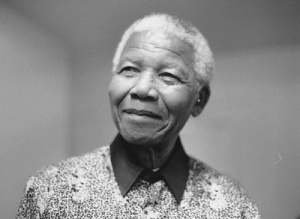Nelson Mandela a secular saint?

The inevitable moment of Nelson “Madiba” Mandela’s departure from this world came last Thursday evening, 5 December. Given that he had been so frail for some time, his death was not unexpected, yet that does not lessen the impact of his loss. As South Africa and the world honour his life through various services and memorials all this week, Erin Wilson discusses what Mandela’s fight for equality and justice for the marginalized and oppressed in apartheid South Africa means for an interdependent and interconnected world and whether Mandela is what some have called “a secular saint.”
The death of Nelson Mandela is being mourned throughout the world on a scale rarely witnessed. His struggle for his own freedom and the freedom of South Africa from the brutal system of apartheid is one that has inspired subsequent generations of political leaders and human rights activists the world over. He has been revered, honoured and admired by billions. Archbishop Emeritus Desmond Tutu, another key figure in the reconciliation process Mandela implemented to rebuild post-apartheid South Africa, described him as “the leader of our generation who stood head and shoulders above his contemporaries — a colossus of unimpeachable moral character and integrity, the world’s most admired and revered public figure… he will go down in history as South Africa’s George Washington, a person who within a single five-year presidency became the principal icon of both liberation and reconciliation, loved by those of all political persuasions as the founder of modern, democratic South Africa."
Secular Saint
Despite their close friendship and the work they did in pursuing justice and reconciliation in post-apartheid South Africa, Mandela is regarded in an entirely different way from Tutu. Tutu has always been overtly religious in his activism and his interventions in public life. Mandela, despite his own strong, if eclectic, spirituality, has rarely made overt religious reference a large part of his public rhetoric and his activism. He has instead emphasized values of justice, equality, the human spirit and common humanity, without reference to any particular religious or political worldview. This may be why one BBC reporter described him as the closest the world has to a secular saint.
Erin Wilson is the Director of the Centre for Religion, Conflict and the Public Domain, Faculty of Theology and Religious Studies, University of Groningen. This article was originally published at ABC Religion and Ethics
More news
-
06 January 2026
Connecting with history
